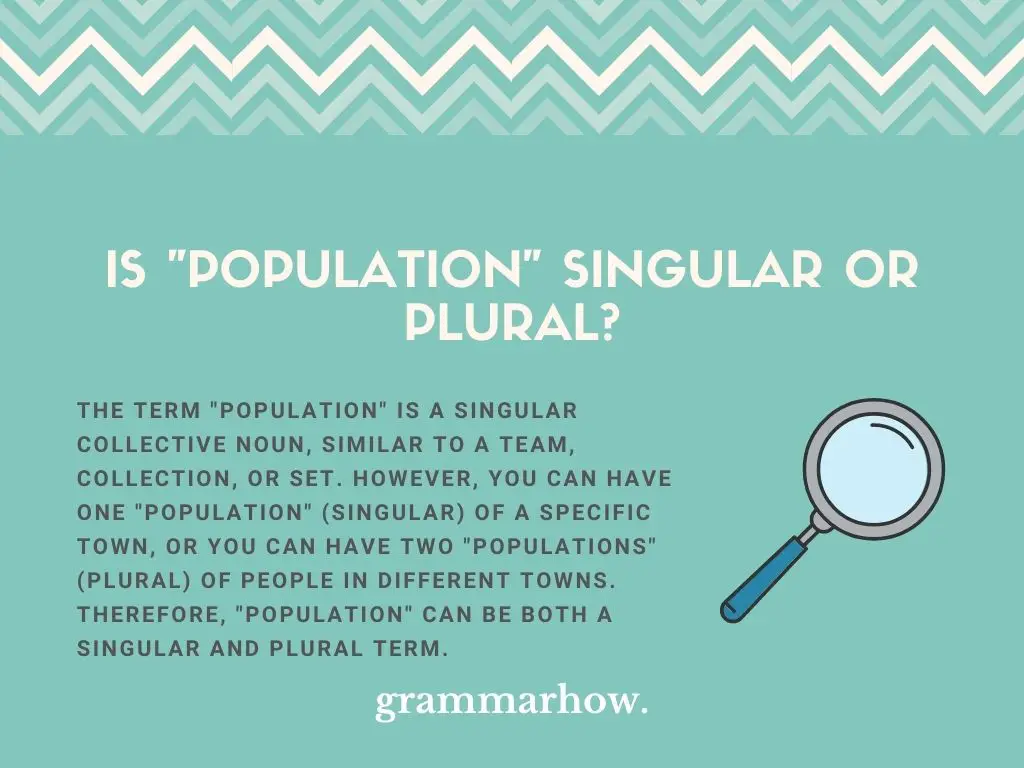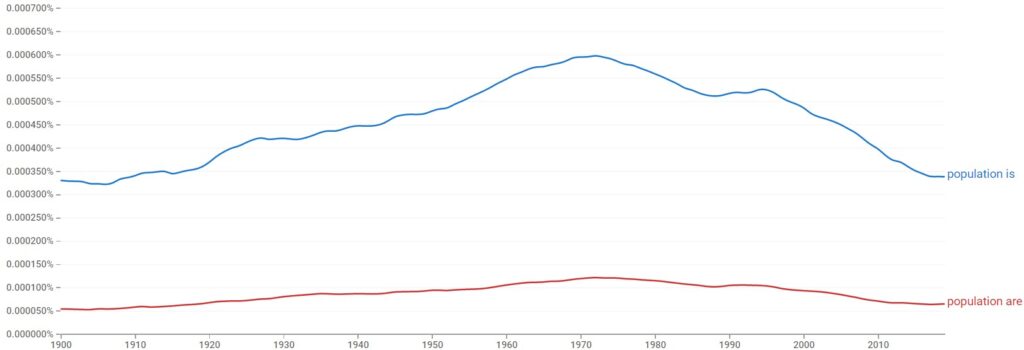The term “population” is commonly seen, however, many folks are unaware of whether it should be considered a singular term or a plural one. Because of this, this article will be centered around this topic, including some helpful examples for additional information purposes.
Is “Population” Singular Or Plural?
The term “population” is a singular collective noun, similar to a team, collection, or set. However, you can have one “population” (singular) of a specific town, or you can have two “populations” (plural) of people in different towns. Therefore, “population” can be both a singular and plural term.

Although a team or collection can have multiple members or pieces, it is still one singular team or collection. The same can be said for the term “population” when we are discussing the population of a single city.
It becomes a plural term when an “s” is added to the end of the word, and we are describing more than one team, more than one collection, or in this case, more than one city’s population.
“Population” As Singular
“Population” is used as a singular term, whenever we are meaning to discuss a single town, city, or village’s “population”. We should not use the singular version of the term “population” when we are collectively speaking about more than one town, city, or village.
We will now go over the following examples that will accurately highlight how we can correctly use the singular form of “population” in a sentence:
- The population of Canada’s capital city has been steadily growing over the last decade.
- It’s a sad fact, but the homeless population in Toronto is growing every year.
- Half of the population of my hometown is part of the Roman Catholic religion.
- The indigenous population was subjugated and exploited by foreign conquerors.
- The total population of Australia is just shy of 26 million people.
- India now has a total population of nearly 1.4 billion people.
- The bulk of the population is concentrated in urban cities, as opposed to living rurally.
“Population” As Plural
“Population” is used as a plural term, whenever we are meaning to discuss multiple towns, cities, or villages’ “populations”. The key difference that makes the term “population” correctly plural, is when we add the letter “s” to the end of the word.
We will now look over some examples that will showcase how to adequately and appropriately use the plural form “populations” in a sentence:
- Oil spills are disastrous for marine life populations across the globe.
- Many of the world’s major cities have populations exceeding 5 million.
- During the time of exploration and conquering, many of the world’s populations were enslaved or dispersed.
- Insect populations fluctuate heavily from year to year.
- They had not been exposed to deadly illnesses like the vast urban populations.
- The homeless populations in major cities are becoming a stark reminder of the housing crisis.
- Populations of endangered animals are being decimated annually by hunters, deforestation, etc.
Which Is Used The Most – “Population Is” Or “Population Are”?
When looking at the data that has been provided by Google Ngram Viewer, it’s clear to see that the phrase “population is” is used far more frequently than the phrase “population are”. This has been a consistent trend from the beginning of the 1990s, into the present day.

This will have an abundance to do with the fact that the phrase “population are” is not a properly constructed English phrase. We would instead write “populations are” if we wanted to ensure the correctness of this phrase.
When we are deciding on whether to use the term “is” or the term “are”, we should decide whether the noun preceding the term is singular or plural. If the noun is singular, we will use the term “is”. On the other hand, if the noun is plural, then we will use the term “are”. The same can be said for collective nouns, like the term “population”.
Most Of The “Population” Is Or Are?
As we are aware that the term “population” is a singular collective noun, we will follow the correct rules of English grammar, and we will use the term “is”. This is because “is” follows singular nouns, while the term “are” will follow plural nouns.
Therefore, if we are speaking in regards to the plural term “populations”, we will follow this with the term “are”, as opposed to “is”.
